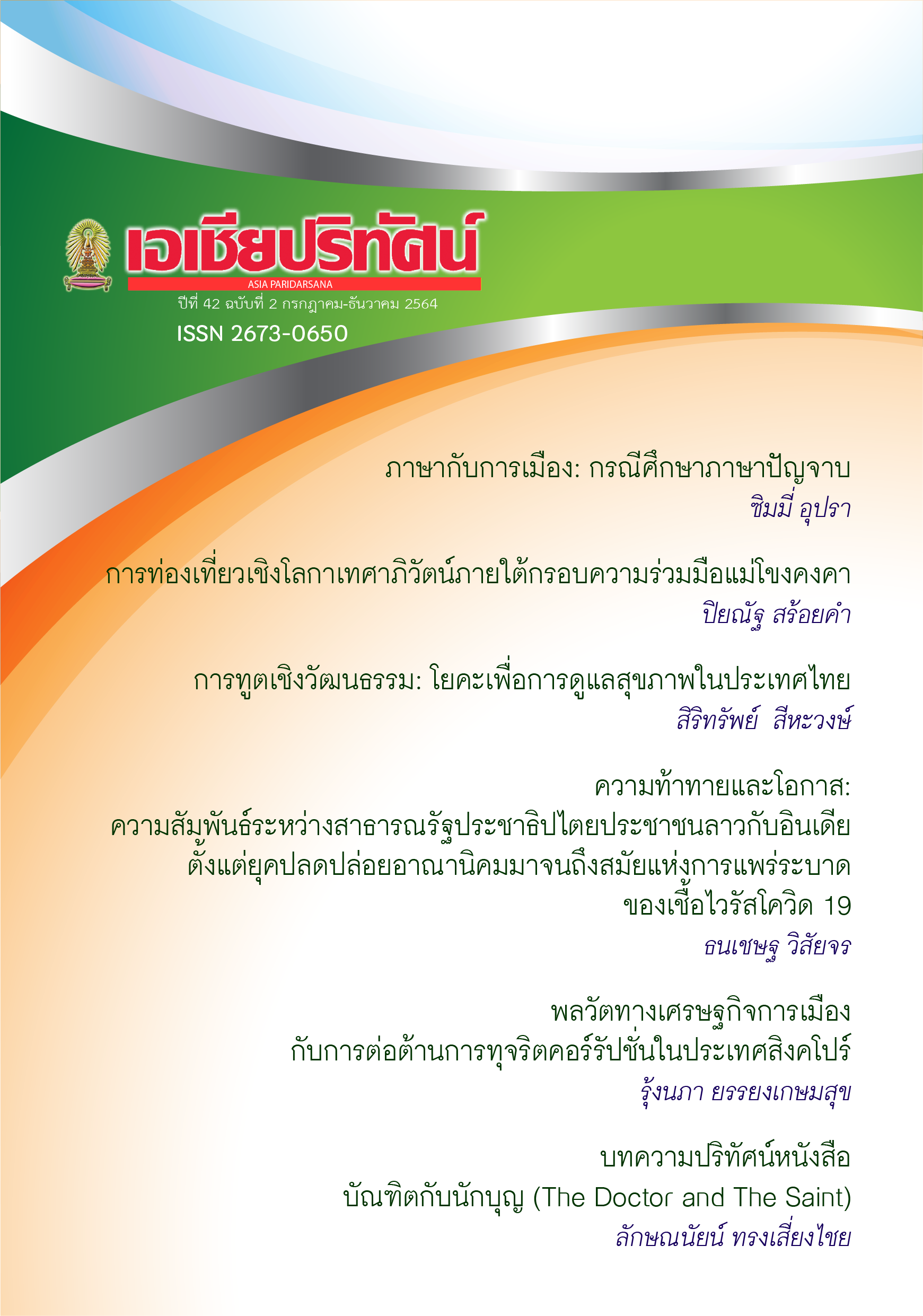Economic and Political Structure and Anti-Corruption in Singapore.
Main Article Content
Abstract
This research aimed to study the political economy of anti-corruption in Singapore during Prime Minister Lee Kuan Yew, Goh Jok Tong and Lee Hsien Loong, and the effects of the political economic structural change of anti-corruption in Singapore. Research data collection was documentary research, an analyzed through political economy analytical framework. The research results showed that establishing the measures, mechanisms and cultures in fighting against corruption including changing in attitudes and behaviors of people since Prime Minister Lee Kuan Yew were vital foundations for the restructuring, processes and mechanisms of effective anti-corruption. show that corruption is a high-risk action. These actions were part of nation-building and economic development of Singapore. Later, in the period of Prime Minister Goh Jok Tong and Lee Hsien Loong, they continued to pursue intensive action from Lee Kuan Yew, including constantly modifying to keep various mechanisms and measures up to date accordance to the change. The result of earnest commitment leads to an integrated solution of economic, political, legal, social and cultural problems together. This caused Singapore is ranked as one of the world's most transparent and highly competitive advantage country.
Article Details

This work is licensed under a Creative Commons Attribution-NonCommercial-NoDerivatives 4.0 International License.
บทความทุกบทความเป็นลิขสิทธิ์ของสถาบันเอเชียศึกษา ดูตัวอย่างอื่นประกอบReferences
ภาษาไทย
กรุงเทพธุรกิจออนไลน์. 2558. สิงคโปร์ประกาศมาตรการขั้นเด็ดขาดปราบทุจริต หลังเจอเรื้องอื้อฉาวเป็นระลอก. มิถุนายน 2562.https://www.bang kokbiznews.com/news/detail/628732.
กองบรรณาธิการ TCIJ. 2560. ร้องปธน.สิงคโปร์ ตั้งทีมสอบสวนนายกฯ ลี เซียนลุง หลังใช้อำนาจโดยมิชอบต่อพี่น้องร่วมตระกูล. มิถุนายน 2562. https://www.tcijthai.com/news/2017/16/asean/7169.
ชัยวัฒน์ ม่านศรีสุข. 2561. “นโยบายสาธารณะด้านการต่อต้านการคอร์รัปชั่นในบริบทโลก.” ใน เอกสารการสอนชุดวิชานโยบายสาธารณะในบริบทโลก (หน่วยที่ 4). นนทบุรี : สำนักพิมพ์ มหา-วิทยาลัยสุโขทัยธรรมาธิราช.
โชคสุข กรกิตติชัย. 2559. ปัญหาการคอร์รัปชั่นของกลุ่มประเทศอาเซียน. กรุงเทพฯ: สำนักวิชาการ สำนักงานเลขาธิการสภาผู้แทนราษฎร.
ปาลิดา พุทธประเสริฐ. 2558. 'การศึกษาสร้างชาติสิงคโปร์' ประวัติศาสตร์จุดเริ่มความเข้าใจ 'เศรษฐกิจ-การเมือง' นำอาเซียน. มีนาคม 2562. https:// www.tcijthai.com/news/2015/29/scoop/2275.
ยุทธศักดิ์ คณาสวัสดิ์. 2552. บีโอไอ:ทำไมสิงคโปร์แก้ไขปัญหาคอร์รัปชันเป็นผลสำเร็จ?. มีนาคม 2562. https://mgronline.com/daily/detail/952000 0073000.
วิทยากร เชียงกูล. 2551. ประสบการณ์แก้ไขปัญหาคอร์รัปชั่นของประเทศสิงคโปร์. ธันวาคม 2561. https://witayakornclub.wordpress.com/2008/04/20ประสบการณ์แก้ไขปัญหาคอ/
สำนักข่าวอิศรา. 2562. ส่องคดีทุจริตโลก:อดีต ผอ.สนามบินชางงีสิงคโปร์ รับสินบน แลกปลอมแปลงเอกสารเอื้อ บ.ไอที. ธันวาคม 2562. https://www. isranews.org/article/isranews-scoop/83969-changi.html.
สำนักวิชาการ สำนักงานเลขาธิการสภาผู้แทนราษฎร. 2559. สาธารณรัฐสิงคโปร์กับการป้องกันและปราบปรามการทุจริต. กรุงเทพฯ: สำนักวิชาการ สำนักงานเลขาธิการสภาผู้แทนราษฎร.
China Radio International. 2558. สิงคโปร์จะเพิ่มกำลังปราบปรามการทุจริตคอรัปชั่น. มิถุนายน 2562. http://thai.china.com/news/world/1042/20150114 /253992.html.
Hesse004. 2560. เปิดโปรไฟล์หน่วยงานต่อต้านคอร์รัปชันทั่วโลก (ตอนที่ 1) : รู้จัก CPIB. มีนาคม 2562. https://thaipublica.org/2017/04/hesse004-69/.
ภาษาอังกฤษ
Ang, P. (2019, 23 December). Former Changi Airport unit employee charged after receiv-ing more than $200,000 in bribes. Retrieved December 24, 2019, from https://ww w.straitstimes.com/singapore/courts-crime/former-changi-airport-employee-charge d-after-receiving-more-than-200000-in.
Bray, J. 2004. “International business attitudes toward corruption.” In Transparency International. (ed.). Global Corruption Report 2004: 316-318. London: Pluto Press.
Corrupt Practices Investigation Bureau. 2016a. Organisational Structure. March 11. https://www.cpib.gov.sg/about-us/our-work/organisational-structure.
Hill, M. & Fee, L. K. 1995. The Politics of Nation Building and Citizenship in Singapore. New York: Routledge.
Klitgaard, Robert. 1991. Controlling Corruption. California: University of California Press.
Lambsdorff, J. G. & Taube, M. & Schramm, M. ed. 2005. “The use of intermediaries and other ‘alternatives’ to bribery.” The New Institutional Econo-mics of Corruption.112-137. New York: Routledge.
Lee, Hsien Loong. 2003. Lee Hsien Loong: Remaking the Singapore Economy. March 2. https://www.bis.org/review/r030428d.pdf
Lim, Vincent. 2018. “An Overview of Singapore’s Anti-Corruption Strategy and the Role of the CPIB in Fighting Corruption.” Resource Material Series No.104. March 2.
https://www.unafei.or.jp/publications/pdf/RS_No104/No104_2_COVER.pdf.
Liu Hong and Zhang Huimei. 2016. “Lee Kuan Yew’s Thoughts on Talent and Singapore’s Development Strategy” In Chen Ning Yang, Gungwu Wang and Ying-shih Yu. Lee Kuan Yew Through The Eyes Of Chinese Scholars. 97-115. Singapore : World Scientific.
Oehlers, A. 2005. “Corruption: the peculiarities of Singapore.” In Tarling, N. (ed.). Corruption and Good Governance in Asia. 149-164. New York: Routledge.
Ortmann, Stephen. 200). “Singapore: The Politics of Inventing National Identity.”Journal of Current Southeast Asian Affairs 28(4): 23-46.
Prime Minister’s Office. 2004. National Rally 2004. March 2. https://www.pmo.gov.sg/Newsroom/prime-minister-lee-hsien-loongs-national-day-rally-2004-english.
Quah, J. 2006. “Preventing Police Corruption in Singapore: The Role of Recruitment, Training and Socialisation.” Asia Pacific Journal of Public Administration 28 (1): 59-75.
Rose-Ackerman, Susan. 1999. Corruption and Government. Causes, consequences and reform. Cambridge: Cambridge University Press.
Seng, Y. L. and Martin, A. (n.d.). Anti-Corruption in Singapore. December 11. https://globalcompliancenews.com/anti-corruption/anti-corruption-in-singapore/
Singapore Legal Advice. 2018. All You Need to Know About Corruption in Singapore. March 11. https://singaporelegaladvice.com/law-articles/all-you-need-to-know-about-corruption-in-singapore/
Tanzi, V. 1997. “Opportunities and Options for Reform: Comments.” In Elliott, K. A. (ed.). Corruption and the Global Economy. 163-169. Washington, DC: Institu-te for International Economics.
Transparency International. 2020. Corruption Perceptions Index 2020. February 12. https: //www.transparency.org/en/cpi/2020.
Tremewan, C. 1994. The Political Economy of Social Control in Singapore. New York: St. Martin’s Press.
UNDP. 2020. The Next Frontier: Human Development and the Anthropocene. February 1. http://hdr.undp.org/sites/all/themes/hdr_theme/country-notes/SGP.pdf.
Uslaner, E. M. 2008. “The Easy and Hard Cases: Africa and Singapore and Hong Kong.” In Corruption, Inequality, and the Rule of Law: The Bulging Pocket Makes the Easy Life. 180-213. New York: Cambridge University Press.
“Why Singapore works: five secrets of Singapore’s success Five secrets of Singapore’s success.” 2018.Public Administration and Policy. 21 (1): 5-21.
Woo, J. J. 2016. Singapore as an International Financial Centre: History, Policy and Politics. London: Palgrave Macmillan.


